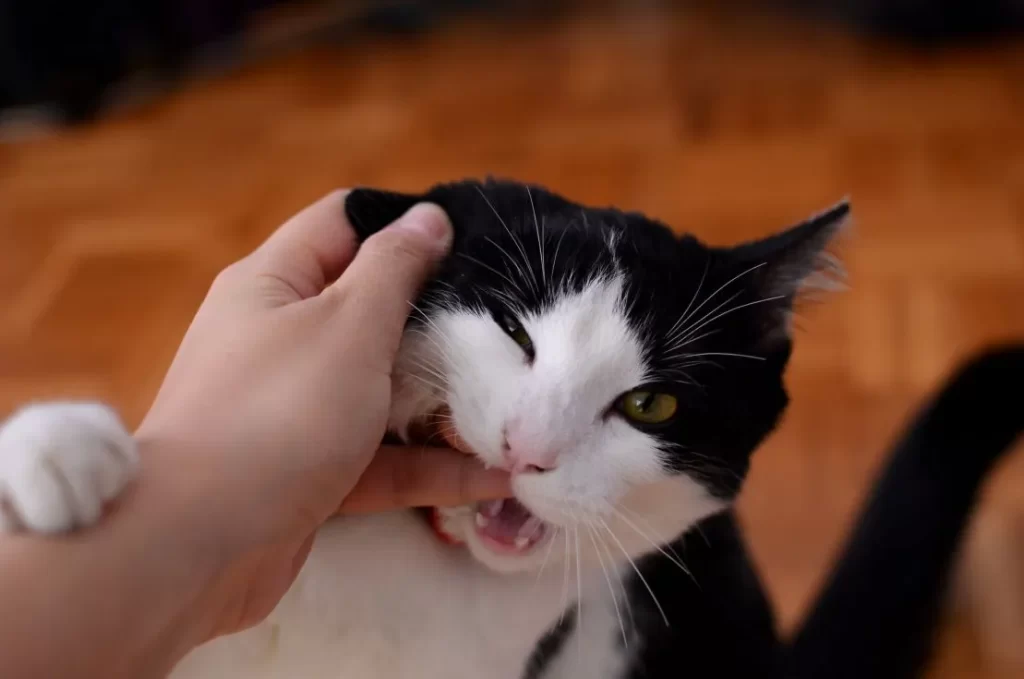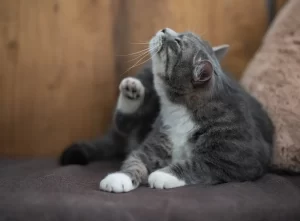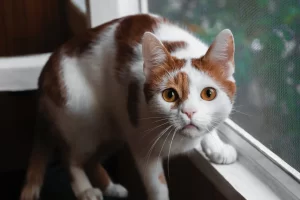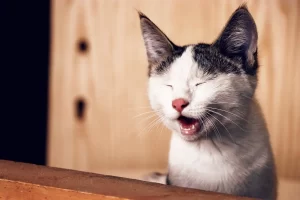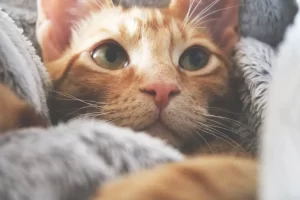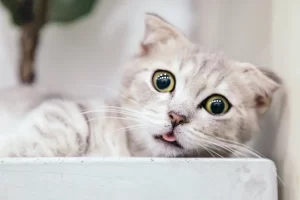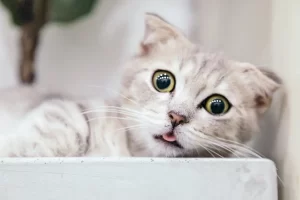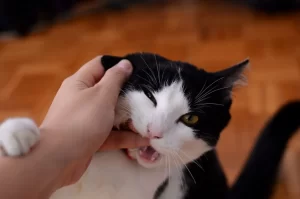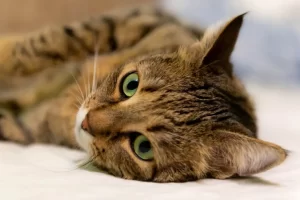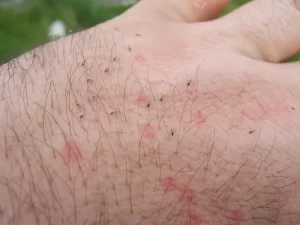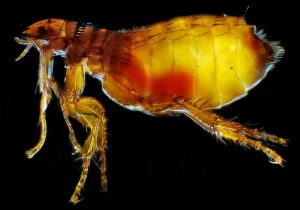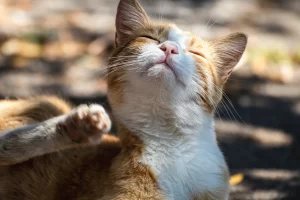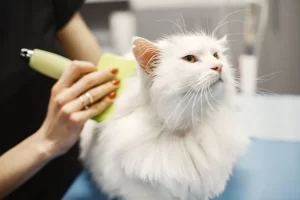Cats are some of the most beloved pets in the world, known for their grace, independence, and unique personalities. Whether you’re a lifelong cat lover or considering getting a cat for the first time, there are a wide variety of breeds and types to choose from. In this post, we’ll be taking a look at the top 20 coolest cats to own, based on their popularity and distinctive looks. From sleek and sophisticated to fluffy and adorable, these cats are sure to make great companions for any cat lover.
Table of Contents
ToggleThe coolest looking cats with images
Learn more about the coolest cats!
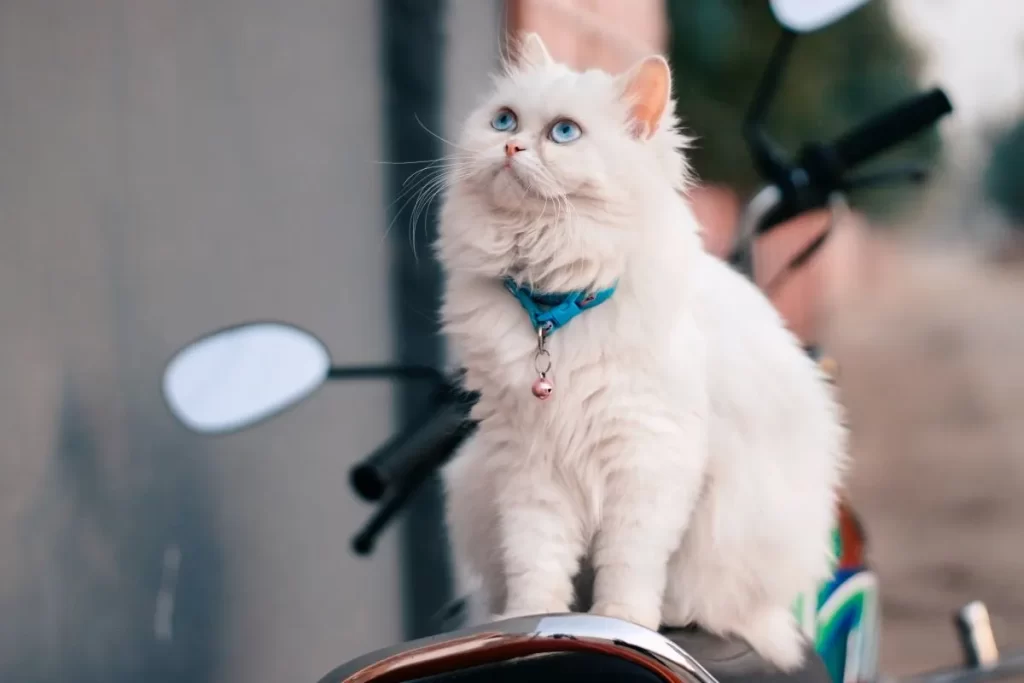
Persian cat
The Persian cat is a popular breed known for its luxurious, long fur, round face, and sweet disposition. Compared to other cat breeds, Persians are known for their calm, laid-back personalities and affectionate nature. They are ideal for people who want a cat that enjoys cuddling and lounging around the house. Persians are also a low-maintenance breed, as they are not particularly active and do not require a lot of exercise or playtime. However, their long hair does require regular grooming to prevent matting and tangles.
Another important characteristic of Persians is their tendency to develop health issues related to their flat faces, such as respiratory problems and eye infections. It’s important for Persian owners to keep a close eye on their cat’s health and take them for regular check-ups with a veterinarian. Additionally, Persians are a relatively quiet breed and are not known for being vocal, which can be a pro or con depending on the owner’s preferences. Overall, Persian cats are a great choice for people looking for a gentle, loving companion that requires minimal exercise and enjoys lounging around the house.
| Energy level | Low | Origin | Iran |
| Grooming requirements | High | Coat type | Long-haired |
| Size | Medium | Intelligence | Low |
| Temperament | Calm | Personality traits | Affectionate |
| Health concerns | Polycystic kidney disease | Vocalization | Low |
| Activity level | Low | Socialization | Moderate |
| Living situation | Indoor only | Cost | High |
| Trainability | Low | Purpose | Companion |
| Compatibility | Good with children | Commitment | Long-term commitment |
| Energy level | Low |
| Grooming requirements | High |
| Size | Medium |
| Temperament | Calm |
| Health concerns | Polycystic kidney disease |
| Activity level | Low |
| Living situation | Indoor only |
| Trainability | Low |
| Compatibility | Good with children |
| Origin | Iran |
| Coat type | Long-haired |
| Intelligence | Low |
| Personality traits | Affectionate |
| Vocalization | Low |
| Socialization | Moderate |
| Cost | High |
| Purpose | Companion |
| Commitment | Long-term commitment |
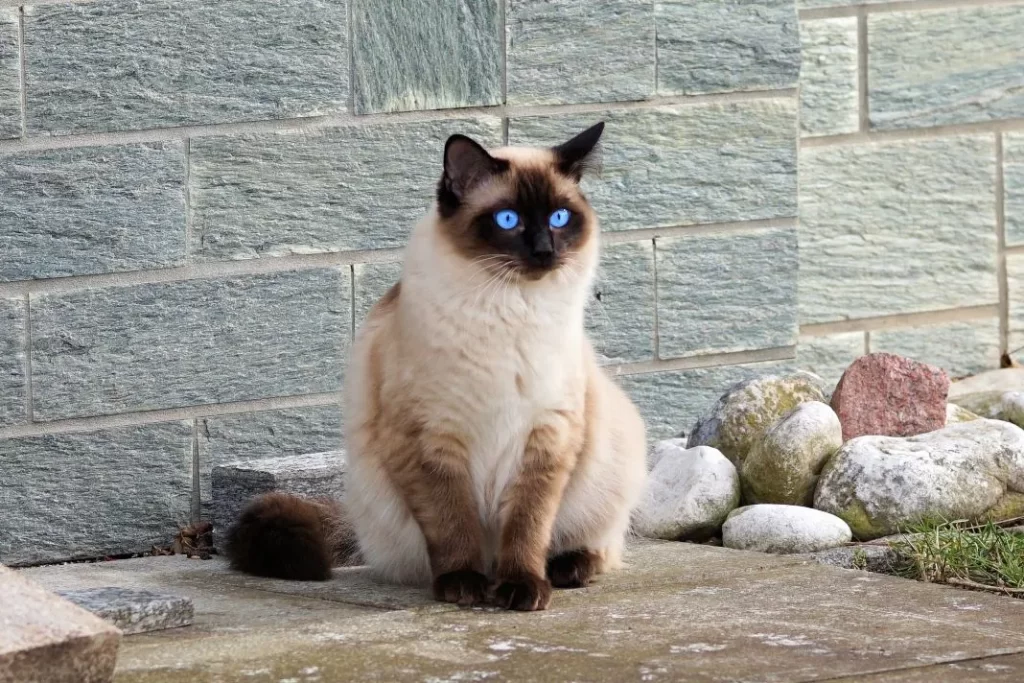
Siamese cat
Siamese cats are an intelligent and highly social breed, known for their striking blue eyes and pointed coat pattern. Compared to other cat breeds, Siamese cats are highly active and require plenty of mental and physical stimulation to stay happy and healthy. They are known for their love of play and can be quite vocal, making them a great choice for owners who want an interactive and engaging pet.
Another important characteristic of Siamese cats is their strong attachment to their owners. They are a highly loyal and affectionate breed, and enjoy spending time with their human companions. However, they can also be quite demanding and require a lot of attention, making them less suitable for owners who are frequently away from home or unable to devote a lot of time to their pet. Siamese cats are also known for their strong personalities and can be quite stubborn, which can be both a pro and a con depending on the owner’s preferences.
Lastly, it’s important to note that Siamese cats are prone to certain health issues, such as dental problems and respiratory issues. They are also more susceptible to developing hyperthyroidism and kidney disease than some other breeds. As such, it’s important for Siamese owners to keep a close eye on their cat’s health and schedule regular check-ups with a veterinarian. Overall, Siamese cats are a great choice for owners who want an active and engaging companion that is highly affectionate and loyal, but who are willing to provide plenty of mental and physical stimulation and care for their pet’s health needs.
| Energy level | High | Origin | Thailand |
| Grooming requirements | Low | Coat type | Short-haired |
| Size | Medium | Intelligence | High |
| Temperament | Affectionate, intelligent | Personality traits | Vocal, curious |
| Health concerns | Amyloidosis, asthma, dental problems | Vocalization | High |
| Activity level | High | Socialization | High |
| Living situation | Indoor home | Cost | Moderate |
| Trainability | High | Purpose | Companion, show |
| Compatibility | Good with pets | Commitment | Long-term commitment |
| Energy level | High |
| Grooming requirements | Low |
| Size | Medium |
| Temperament | Affectionate, intelligent |
| Health concerns | Amyloidosis, asthma, dental problems |
| Activity level | High |
| Living situation | Indoor home |
| Trainability | High |
| Compatibility | Good with pets |
| Origin | Thailand |
| Coat type | Short-haired |
| Intelligence | High |
| Personality traits | Vocal, curious |
| Vocalization | High |
| Socialization | High |
| Cost | Moderate |
| Purpose | Companion, show |
| Commitment | Long-term commitment |
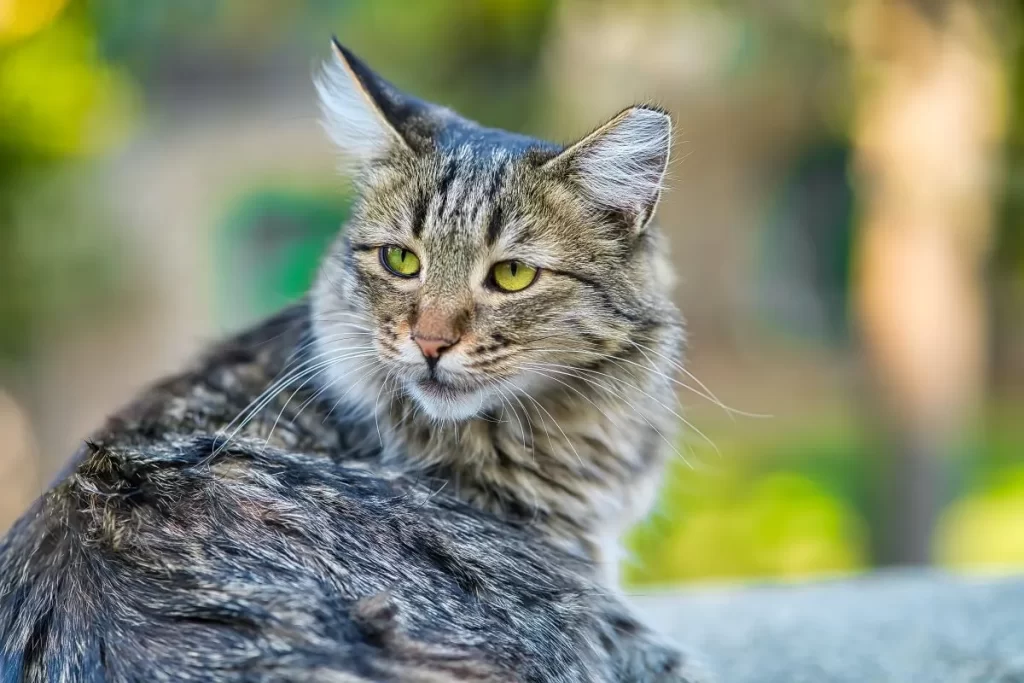
Maine Coon cat
The Maine Coon is a large and muscular breed, known for their distinctive long and shaggy fur, big ears, and gentle temperament. Compared to other cat breeds, Maine Coons are friendly, social, and enjoy interacting with their human companions. They are also known for their intelligence and trainability, making them an excellent choice for owners who want a cat that can learn tricks and commands.
Another important characteristic of Maine Coons is their laid-back personality. They are not particularly demanding or high-strung, and are content to spend time lounging around the house or playing with toys. However, they are still an active breed and require plenty of exercise and mental stimulation to stay happy and healthy. Their long fur also requires regular grooming to prevent matting and tangles.
It’s also worth noting that Maine Coons are generally healthy cats, with a relatively long lifespan compared to some other breeds. However, they are prone to certain health issues such as hip dysplasia and heart problems. As such, it’s important for Maine Coon owners to keep a close eye on their cat’s health and take them for regular check-ups with a veterinarian. Overall, Maine Coons are a great choice for owners who want a friendly, laid-back cat that enjoys interacting with their human companions, but who are also willing to provide plenty of exercise and grooming to keep their pet happy and healthy.
| Energy level | Medium | Origin | United States |
| Grooming requirements | High | Coat type | Long-haired |
| Size | Large | Intelligence | High |
| Temperament | Affectionate, sociable | Personality traits | Playful, loyal |
| Health concerns | Hip dysplasia, hypertrophic cardiomyopathy, spinal muscular atrophy | Vocalization | Low |
| Activity level | Medium | Socialization | High |
| Living situation | Indoor or outdoor home | Cost | High |
| Trainability | High | Purpose | Companion, show |
| Compatibility | Good with pets | Commitment | Long-term commitment |
| Energy level | Medium |
| Grooming requirements | High |
| Size | Large |
| Temperament | Affectionate, sociable |
| Health concerns | Hip dysplasia, hypertrophic cardiomyopathy, spinal muscular atrophy |
| Activity level | Medium |
| Living situation | Indoor or outdoor home |
| Trainability | High |
| Compatibility | Good with pets |
| Origin | United States |
| Coat type | Long-haired |
| Intelligence | High |
| Personality traits | Playful, loyal |
| Vocalization | Low |
| Socialization | High |
| Cost | High |
| Purpose | Companion, show |
| Commitment | Long-term commitment |

Sphynx cat
The Sphynx cat is a unique and distinctive breed known for its hairless appearance, wrinkled skin, and large ears. Compared to other cat breeds, Sphynx cats are highly social and affectionate, often described as “velcro” cats due to their tendency to stick close to their human companions. They are also highly energetic and playful, making them a great choice for owners who want an interactive and engaging pet.
Another important characteristic of Sphynx cats is their lack of fur, which means they require regular skin care to prevent issues such as acne and sunburn. They also tend to get cold easily and may require a sweater or heated bed in cooler climates. Despite their hairless appearance, Sphynx cats are not hypoallergenic, as their skin still produces allergens that can cause reactions in some people.
It’s also worth noting that Sphynx cats are prone to certain health issues, such as heart disease and respiratory issues. As such, it’s important for Sphynx owners to keep a close eye on their cat’s health and take them for regular check-ups with a veterinarian. Overall, Sphynx cats are a great choice for owners who want a highly affectionate and playful cat that is unique in appearance, but who are also willing to provide the specialized care and attention required to keep their pet healthy and happy.
| Energy level | High | Origin | Canada |
| Grooming requirements | Low | Coat type | Hairless |
| Size | Medium | Intelligence | High |
| Temperament | Playful, affectionate, active | Personality traits | Inquisitive, intelligent |
| Health concerns | Skin sensitivity, dental problems, respiratory issues | Vocalization | High |
| Activity level | High | Socialization | High |
| Living situation | Indoor home | Cost | High |
| Trainability | Moderate | Purpose | Companion, show |
| Compatibility | Good with pets | Commitment | Long-term commitment |
| Energy level | High |
| Grooming requirements | Low |
| Size | Medium |
| Temperament | Playful, affectionate, active |
| Health concerns | Skin sensitivity, dental problems, respiratory issues |
| Activity level | High |
| Living situation | Indoor home |
| Trainability | Moderate |
| Compatibility | Good with pets |
| Origin | Canada |
| Coat type | Hairless |
| Intelligence | High |
| Personality traits | Inquisitive, intelligent |
| Vocalization | High |
| Socialization | High |
| Cost | High |
| Purpose | Companion, show |
| Commitment | Long-term commitment |
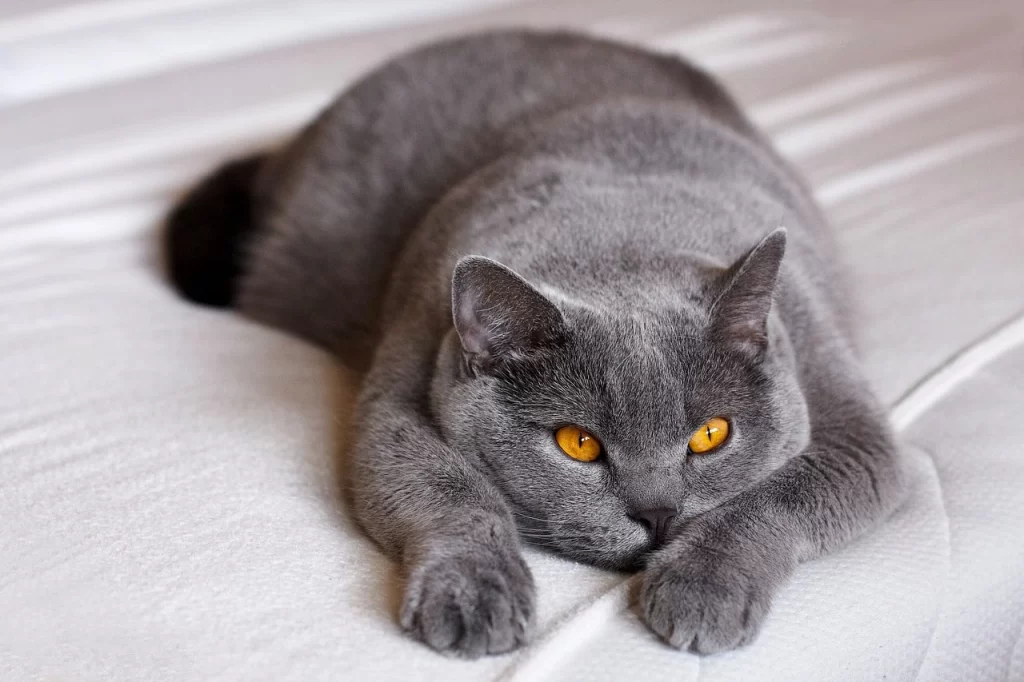
British Shorthair cat
The British Shorthair is a calm and affectionate breed known for their round faces, plush fur, and easy-going temperament. Compared to other cat breeds, British Shorthairs are relatively low-energy and are content to spend time lounging around the house or playing with toys. They are also highly social and enjoy interacting with their human companions, making them a great choice for families with children or other pets.
Another important characteristic of British Shorthairs is their loyalty and devotion to their owners. They are a highly affectionate breed and enjoy being petted and cuddled, but are also independent enough to entertain themselves when necessary. They are also known for their easy-to-care-for coats, which require minimal grooming compared to some other breeds.
It’s important to note that British Shorthairs can be prone to certain health issues, such as obesity and dental problems. As such, it’s important for owners to monitor their cat’s weight and dental health and take them for regular check-ups with a veterinarian. Overall, British Shorthairs are a great choice for owners who want a calm and affectionate companion that is easy to care for and gets along well with other pets and children.
| Energy level | Low | Origin | United Kingdom |
| Grooming requirements | Moderate | Coat type | Short-haired |
| Size | Medium | Intelligence | Low |
| Temperament | Laid-back | Personality traits | Calm |
| Health concerns | Hypertrophic cardiomyopathy, obesity | Vocalization | Low |
| Activity level | Low | Socialization | Low |
| Living situation | Indoor only | Cost | High |
| Trainability | Low | Purpose | Companion |
| Compatibility | Good with children and dogs | Commitment | Long-term commitment |
| Energy level | Low |
| Grooming requirements | Moderate |
| Size | Medium |
| Temperament | Laid-back |
| Health concerns | Hypertrophic cardiomyopathy, obesity |
| Activity level | Low |
| Living situation | Indoor only |
| Trainability | Low |
| Compatibility | Good with children and dogs |
| Origin | United Kingdom |
| Coat type | Short-haired |
| Intelligence | Low |
| Personality traits | Calm |
| Vocalization | Low |
| Socialization | Low |
| Cost | High |
| Purpose | Companion |
| Commitment | Long-term commitment |
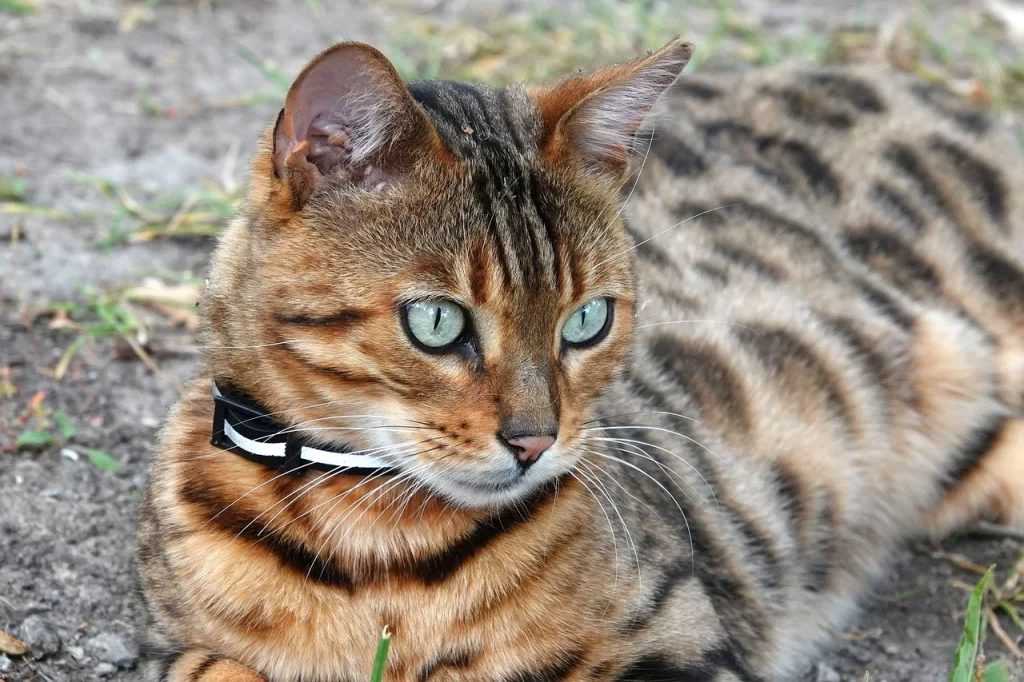
Bangal cat
The Bengal cat is a highly energetic and athletic breed known for their distinctive coat, which features bold stripes and spots reminiscent of a wild cat. Compared to other cat breeds, Bengals are highly social and enjoy interacting with their human companions. They are also highly intelligent and curious, making them an excellent choice for owners who want a cat that can learn tricks and games.
Another important characteristic of Bengals is their high energy level. They are an active breed and require plenty of exercise and mental stimulation to stay happy and healthy. They are also known for their love of water, and may enjoy playing in the sink or bathtub. Their distinctive coat requires minimal grooming, but their nails should be trimmed regularly to prevent them from becoming too long.
It’s important to note that Bengals are a relatively new breed and can be prone to certain health issues such as hip dysplasia and heart problems. As such, it’s important for Bengal owners to keep a close eye on their cat’s health and take them for regular check-ups with a veterinarian. Overall, Bengals are a great choice for owners who want an active and highly intelligent cat that enjoys interacting with their human companions, but who are also willing to provide plenty of exercise and mental stimulation to keep their pet happy and healthy.
| Energy level | High | Origin | United States |
| Grooming requirements | Low | Coat type | Short-haired |
| Size | Medium | Intelligence | High |
| Temperament | Affectionate, energetic | Personality traits | Playful, curious |
| Health concerns | Hypertrophic cardiomyopathy, progressive retinal atrophy | Vocalization | Moderate |
| Activity level | High | Socialization | High |
| Living situation | Indoor home | Cost | High |
| Trainability | Moderate | Purpose | Companion, hunting, show |
| Compatibility | Good with pets | Commitment | Long-term commitment |
| Energy level | High |
| Grooming requirements | Low |
| Size | Medium |
| Temperament | Affectionate, energetic |
| Health concerns | Hypertrophic cardiomyopathy, progressive retinal atrophy |
| Activity level | High |
| Living situation | Indoor home |
| Trainability | Moderate |
| Compatibility | Good with pets |
| Origin | United States |
| Coat type | Short-haired |
| Intelligence | High |
| Personality traits | Playful, curious |
| Vocalization | Moderate |
| Socialization | High |
| Cost | High |
| Purpose | Companion, hunting, show |
| Commitment | Long-term commitment |
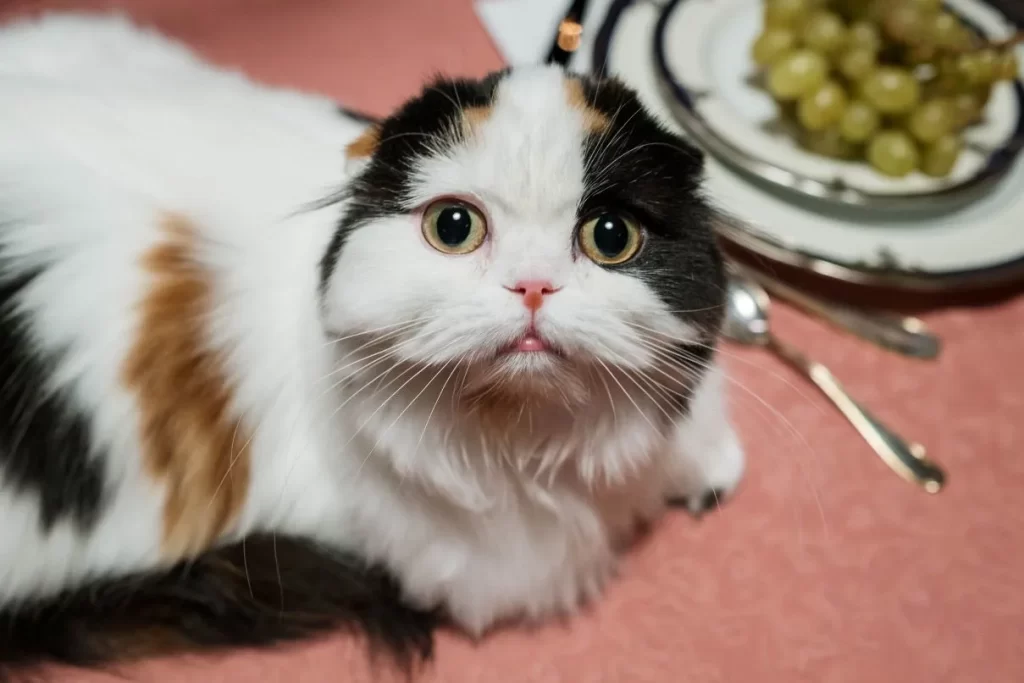
Scottish Fold cat
The Scottish Fold is a unique and distinctive breed known for its folded ears, round face, and plush coat. Compared to other cat breeds, Scottish Folds are generally calm and easy-going, making them a great choice for families with children or other pets. They are also highly affectionate and enjoy spending time with their human companions, often curling up in laps or snuggling up in bed with their owners.
Another important characteristic of Scottish Folds is their tendency towards joint issues due to their folded ears. Some Scottish Folds can develop arthritis or other joint problems later in life, and as such it’s important for owners to monitor their cat’s mobility and take them for regular check-ups with a veterinarian. They are also prone to certain health issues such as kidney disease, and should be fed a high-quality diet to help prevent these problems.
It’s worth noting that Scottish Folds should not be bred to other Scottish Folds, as this can lead to severe health problems in their offspring. Overall, Scottish Folds are a great choice for owners who want a calm and affectionate companion that is unique in appearance, but who are also willing to provide the specialized care and attention required to keep their pet healthy and happy.
| Energy level | Medium | Origin | Scotland |
| Grooming requirements | Low | Coat type | Short-haired |
| Size | Medium | Intelligence | High |
| Temperament | Friendly, affectionate | Personality traits | Laid-back, playful |
| Health concerns | Osteochondrodysplasia | Vocalization | Low |
| Activity level | Medium | Socialization | High |
| Living situation | Indoor home | Cost | High |
| Trainability | Moderate | Purpose | Companion, show |
| Compatibility | Good with pets | Commitment | Long-term commitment |
| Energy level | Medium |
| Grooming requirements | Low |
| Size | Medium |
| Temperament | Friendly, affectionate |
| Health concerns | Osteochondrodysplasia |
| Activity level | Medium |
| Living situation | Indoor home |
| Trainability | Moderate |
| Compatibility | Good with pets |
| Origin | Scotland |
| Coat type | Short-haired |
| Intelligence | High |
| Personality traits | Laid-back, playful |
| Vocalization | Low |
| Socialization | High |
| Cost | High |
| Purpose | Companion, show |
| Commitment | Long-term commitment |
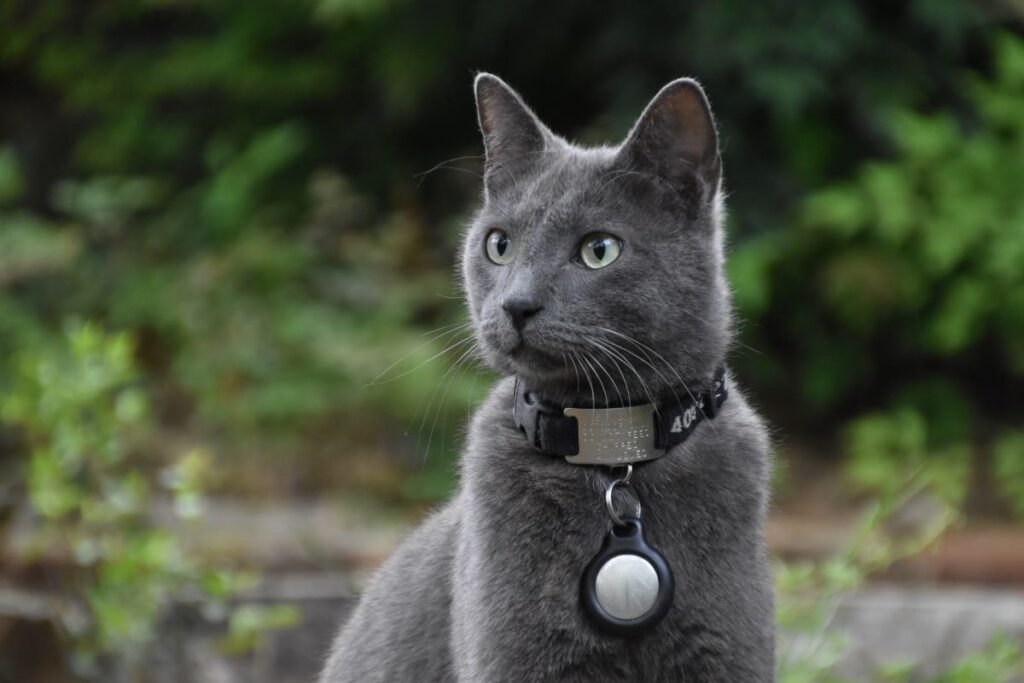
Russian Blue cat
The Russian Blue is a striking and elegant breed known for its distinctive blue-grey coat, emerald-green eyes, and sleek physique. Compared to other cat breeds, Russian Blues are generally calm and reserved, but are also highly intelligent and affectionate with their human companions. They are also highly adaptable and can thrive in both small apartments and larger homes.
Another important characteristic of Russian Blues is their minimal grooming needs. Their short, dense coat requires little maintenance, and they are known for their fastidious grooming habits. They are also generally healthy and have a long lifespan, often living well into their late teens or early twenties.
It’s important to note that Russian Blues can be sensitive to changes in their environment or routine, and may be prone to stress-related health issues. As such, it’s important for owners to provide a stable and stress-free home environment, and to take them for regular check-ups with a veterinarian. Overall, Russian Blues are a great choice for owners who want a calm and elegant companion that is easy to care for and highly adaptable to a variety of living situations.
| Energy level | Medium | Origin | Russia |
| Grooming requirements | Low | Coat type | Short-haired |
| Size | Medium | Intelligence | High |
| Temperament | Reserved | Personality traits | Independent |
| Health concerns | Hypertrophic cardiomyopathy, bladder stones | Vocalization | Low |
| Activity level | Low | Socialization | Moderate |
| Living situation | Indoor only | Cost | High |
| Trainability | Medium | Purpose | Companion |
| Compatibility | Good with children and other pets | Commitment | Long-term commitment |
| Energy level | Medium |
| Grooming requirements | Low |
| Size | Medium |
| Temperament | Reserved |
| Health concerns | Hypertrophic cardiomyopathy, bladder stones |
| Activity level | Low |
| Living situation | Indoor only |
| Trainability | Medium |
| Compatibility | Good with children and other pets |
| Origin | Russia |
| Coat type | Short-haired |
| Intelligence | High |
| Personality traits | Independent |
| Vocalization | Low |
| Socialization | Moderate |
| Cost | High |
| Purpose | Companion |
| Commitment | Long-term commitment |
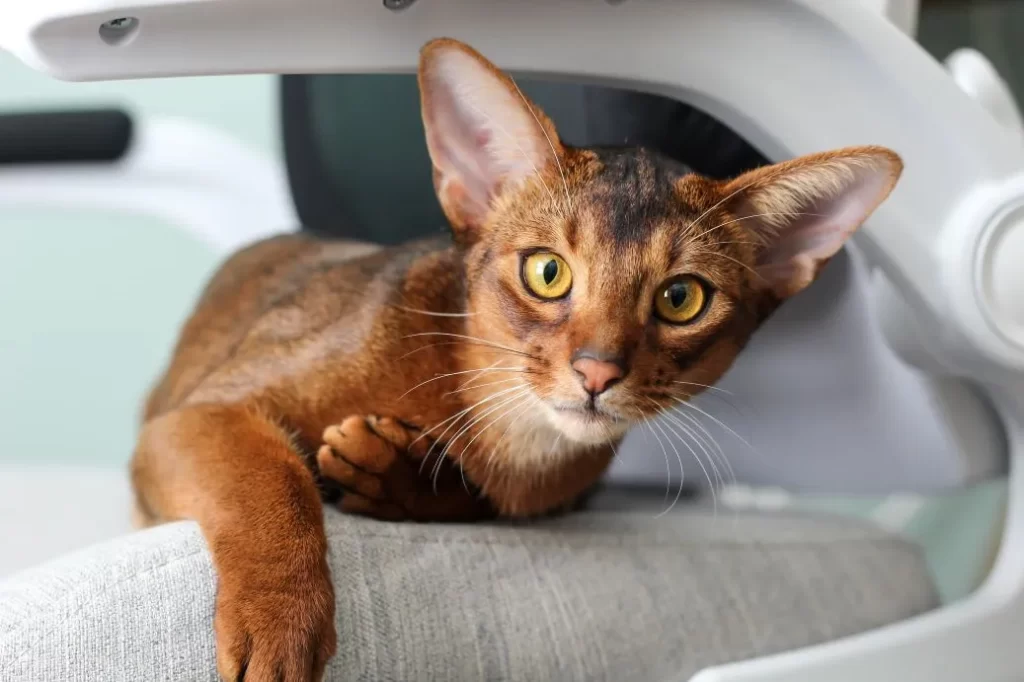
Abyssinian cat
The Abyssinian is a unique and lively breed known for its distinctive ticked coat, athletic physique, and playful personality. Compared to other cat breeds, Abyssinians are highly energetic and require plenty of mental and physical stimulation to keep them happy and healthy. They are also highly social and thrive in households with other pets or human companions who can provide them with plenty of attention and interaction.
Another important characteristic of Abyssinians is their intelligence and trainability. They are highly intelligent and can be trained to perform a variety of tricks and behaviors, making them a popular choice for owners who enjoy training and working with their pets. They are also generally healthy and have a long lifespan, often living well into their late teens or early twenties.
It’s important to note that Abyssinians can be prone to certain health issues such as gingivitis and renal amyloidosis, and should be fed a high-quality diet to help prevent these problems. They also require regular grooming to maintain their short, dense coat, and may be prone to developing hairballs. Overall, Abyssinians are a great choice for owners who want an active and intelligent companion that is highly social and easy to train, but who are also willing to provide the specialized care and attention required to keep their pet healthy and happy.
| Energy level | High | Origin | Ethiopia |
| Grooming requirements | Low | Coat type | Short-haired |
| Size | Medium | Intelligence | High |
| Temperament | Active | Personality traits | Playful |
| Health concerns | Progressive retinal atrophy, patellar luxation | Vocalization | High |
| Activity level | High | Socialization | High |
| Living situation | Indoor/outdoor | Cost | High |
| Trainability | High | Purpose | Companion |
| Compatibility | Good with children | Commitment | Long-term commitment |
| Energy level | High |
| Grooming requirements | Low |
| Size | Medium |
| Temperament | Active |
| Health concerns | Progressive retinal atrophy, patellar luxation |
| Activity level | High |
| Living situation | Indoor/outdoor |
| Trainability | High |
| Compatibility | Good with children |
| Origin | Ethiopia |
| Coat type | Short-haired |
| Intelligence | High |
| Personality traits | Playful |
| Vocalization | High |
| Socialization | High |
| Cost | High |
| Purpose | Companion |
| Commitment | Long-term commitment |
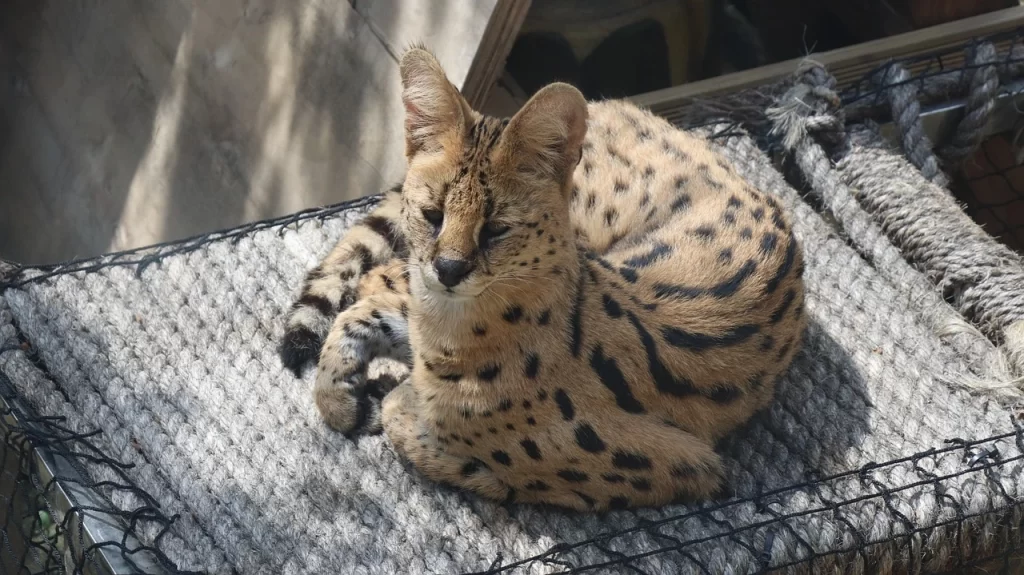
Savannah cat
The Savannah is a unique and exotic breed known for its striking appearance, intelligence, and playful personality. Compared to other cat breeds, Savannahs are highly energetic and require plenty of physical and mental stimulation to keep them happy and healthy. They are also highly intelligent and can be trained to perform a variety of tricks and behaviors, making them a popular choice for owners who enjoy training and working with their pets.
Another important characteristic of Savannahs is their size and strength. As a hybrid breed between a domestic cat and a wild African Serval, which are often known as f1 Savannah cats, Savannahs can be quite large and muscular, and may require a more spacious living environment than some other cat breeds. They are also generally healthy and have a long lifespan, often living well into their late teens or early twenties.
Related read: What Is an F1 Savannah Cat? and how can I get one?!
It’s important to note that Savannahs are not legal in all areas, as they are considered a hybrid or exotic breed in some locations. They may also be prone to certain health issues such as hypertrophic cardiomyopathy, and should be fed a high-quality diet to help prevent these problems. Overall, Savannahs are a great choice for owners who want an exotic and intelligent companion that is highly active and playful, but who are also willing to provide the specialized care and attention required to keep their pet healthy and happy.
| Energy level | High | Origin | United States |
| Grooming requirements | Low | Coat type | Short-haired |
| Size | Large | Intelligence | High |
| Temperament | Active, social, intelligent | Personality traits | Playful, curious |
| Health concerns | Hypertrophic cardiomyopathy, progressive retinal atrophy | Vocalization | Low |
| Activity level | High | Socialization | High |
| Living situation | Indoor or outdoor home | Cost | High |
| Trainability | High | Purpose | Companion, hunting, show |
| Compatibility | Good with pets | Commitment | Long-term commitment |
| Energy level | High |
| Grooming requirements | Low |
| Size | Large |
| Temperament | Active, social, intelligent |
| Health concerns | Hypertrophic cardiomyopathy, progressive retinal atrophy |
| Activity level | High |
| Living situation | Indoor or outdoor home |
| Trainability | High |
| Compatibility | Good with pets |
| Origin | United States |
| Coat type | Short-haired |
| Intelligence | High |
| Personality traits | Playful, curious |
| Vocalization | Low |
| Socialization | High |
| Cost | High |
| Purpose | Companion, hunting, show |
| Commitment | Long-term commitment |
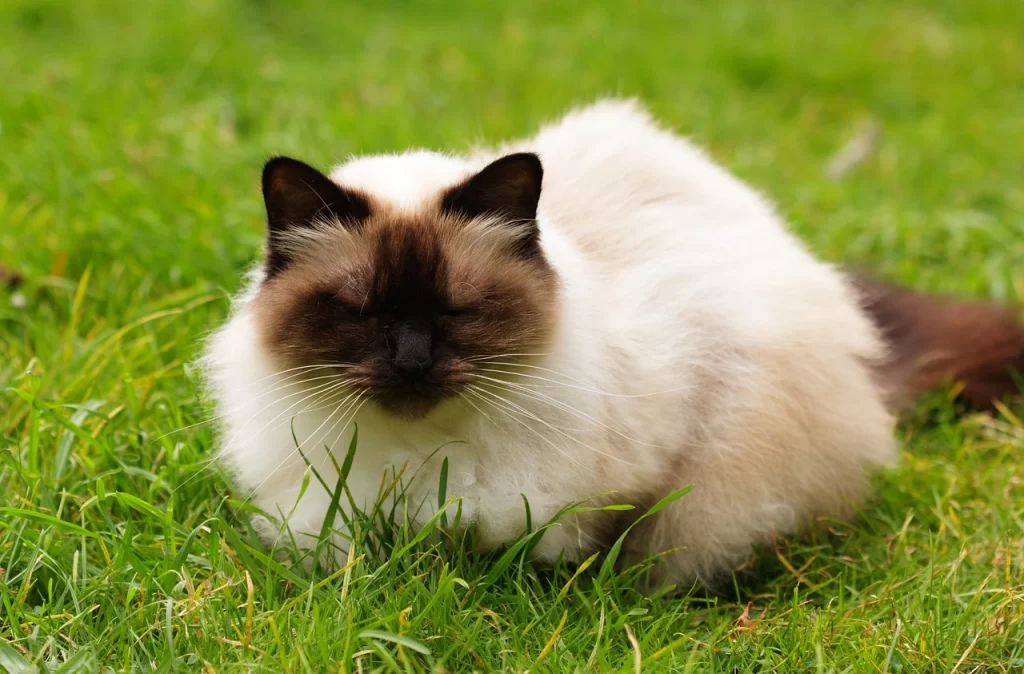
Himalayan cat
The Himalayan cat is a unique and distinctive breed known for its long, silky coat and calm, affectionate personality. This breed is actually a hybrid of the Persian and Siamese breeds, resulting in a cat with the Persian’s luxurious coat and the Siamese’s striking blue eyes and pointed markings. Compared to other cat breeds, Himalayans are generally very laid back and relaxed, making them a great choice for owners who want a calm and affectionate companion.
Another important characteristic of Himalayans is their grooming requirements. Because of their long, thick coats, Himalayans require daily grooming to prevent matting and keep their coats shiny and healthy. They are also prone to certain health issues such as respiratory problems and kidney disease, and should be fed a high-quality diet and receive regular veterinary care to prevent and manage these issues.
Overall, Himalayan cats make great pets for owners who want a gentle and affectionate companion that is easy to care for, but who are also willing to devote the time and attention required to keep their pet healthy and happy. They are not as active or playful as some other breeds, and may prefer a quiet, comfortable living environment. However, they are highly social and thrive on human companionship, making them a great choice for families or individuals who want a loving and loyal feline companion.
| Energy level | Low | Origin | United States |
| Grooming requirements | High | Coat type | Long-haired |
| Size | Medium | Intelligence | Low |
| Temperament | Calm | Personality traits | Affectionate, loyal |
| Health concerns | Breathing difficulties, eye problems, kidney disease | Vocalization | Low |
| Activity level | Low | Socialization | High |
| Living situation | Indoor only | Cost | High |
| Trainability | Moderate | Purpose | Companion |
| Compatibility | Good with children and other pets | Commitment | Long-term commitment |
| Energy level | Low |
| Grooming requirements | High |
| Size | Medium |
| Temperament | Calm |
| Health concerns | Breathing difficulties, eye problems, kidney disease |
| Activity level | Low |
| Living situation | Indoor only |
| Trainability | Moderate |
| Compatibility | Good with children and other pets |
| Origin | United States |
| Coat type | Long-haired |
| Intelligence | Low |
| Personality traits | Affectionate, loyal |
| Vocalization | Low |
| Socialization | High |
| Cost | High |
| Purpose | Companion |
| Commitment | Long-term commitment |
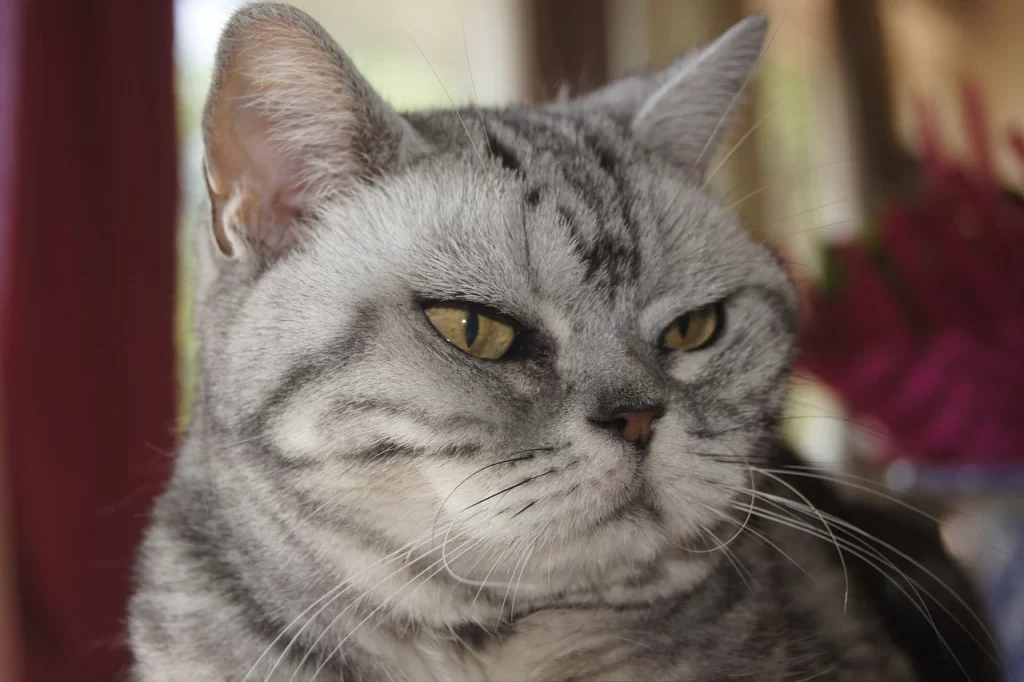
American Shorthair cat
The American Shorthair cat is one of the most popular cat breeds in the United States, known for its playful and affectionate personality, easygoing nature, and striking appearance. These cats have short, dense coats that come in a variety of colors and patterns, including tabby, silver, and black. They are also known for their sturdy and muscular build, making them excellent hunters and active playmates.
Compared to other cat breeds, American Shorthairs are generally easy to care for and require minimal grooming. They are also known for their friendly and sociable personalities, making them great pets for families with children or other pets. However, they can be independent at times and may need some alone time to recharge.
One important thing to note about American Shorthairs is their predisposition to certain health issues, such as obesity and heart disease. Owners should ensure their cats receive a balanced diet and regular exercise to prevent these issues. Regular veterinary checkups are also important to catch any potential health problems early on. Overall, American Shorthairs make wonderful pets for those seeking a playful, affectionate, and low-maintenance cat that is easy to care for and makes a great addition to any household.
| Energy level | Medium | Origin | United States |
| Grooming requirements | Low | Coat type | Short-haired |
| Size | Medium | Intelligence | Medium |
| Temperament | Laid-back | Personality traits | Playful |
| Health concerns | Hypertrophic cardiomyopathy | Vocalization | Low |
| Activity level | Medium | Socialization | Low |
| Living situation | Indoor/outdoor | Cost | Low |
| Trainability | Medium | Purpose | Companion |
| Compatibility | Good with children and dogs | Commitment | Long-term commitment |
| Energy level | Medium |
| Grooming requirements | Low |
| Size | Medium |
| Temperament | Laid-back |
| Health concerns | Hypertrophic cardiomyopathy |
| Activity level | Medium |
| Living situation | Indoor/outdoor |
| Trainability | Medium |
| Compatibility | Good with children and dogs |
| Origin | United States |
| Coat type | Short-haired |
| Intelligence | Medium |
| Personality traits | Playful |
| Vocalization | Low |
| Socialization | Low |
| Cost | Low |
| Purpose | Companion |
| Commitment | Long-term commitment |
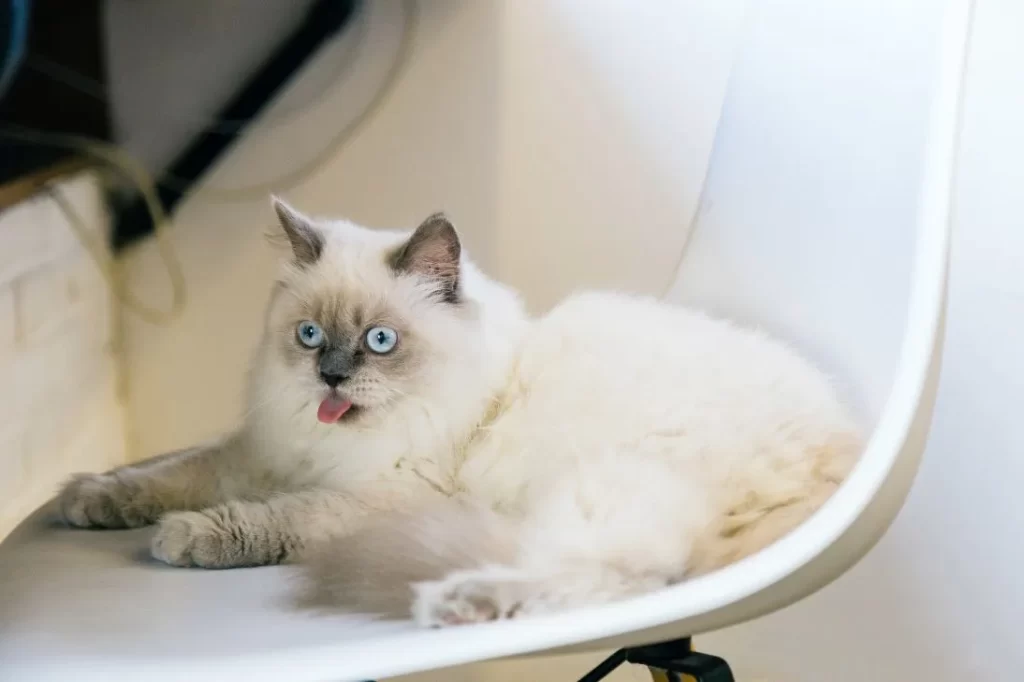
Ragdoll cat
Ragdoll cats are a popular breed known for their docile and affectionate personalities, making them great pets for families with children or other pets. They are known for their large size, with males weighing up to 20 pounds, and their distinctive blue eyes. Ragdolls have soft and silky coats that come in a variety of colors and patterns, including bi-color, mitted, and pointed.
Compared to other cat breeds, Ragdolls are known for their relaxed and easygoing nature, making them excellent indoor pets. They are often referred to as “lap cats” because they enjoy being held and cuddled by their owners. However, they are not overly demanding and can entertain themselves if necessary. Ragdolls also tend to have a calm and gentle disposition, making them less likely to scratch or bite compared to other breeds.
One important thing to note about Ragdoll cats is their susceptibility to certain health issues, such as heart disease and bladder stones. It is important for owners to provide their cats with a balanced diet and regular exercise to prevent these issues. Additionally, regular grooming is necessary to prevent matting and tangling of their long fur. Overall, Ragdoll cats make wonderful pets for those seeking a calm, affectionate, and low-maintenance cat that is easy to care for and makes a great addition to any household.
| Energy level | Low | Origin | United States |
| Grooming requirements | High | Coat type | Long-haired |
| Size | Large | Intelligence | Low |
| Temperament | Affectionate, gentle, relaxed | Personality traits | Calm, docile |
| Health concerns | Hypertrophic cardiomyopathy, bladder stones | Vocalization | Low |
| Activity level | Low | Socialization | High |
| Living situation | Indoor home | Cost | High |
| Trainability | Low | Purpose | Companion, show |
| Compatibility | Good with pets | Commitment | Long-term commitment |
| Energy level | Low |
| Grooming requirements | High |
| Size | Large |
| Temperament | Affectionate, gentle, relaxed |
| Health concerns | Hypertrophic cardiomyopathy, bladder stones |
| Activity level | Low |
| Living situation | Indoor home |
| Trainability | Low |
| Compatibility | Good with pets |
| Origin | United States |
| Coat type | Long-haired |
| Intelligence | Low |
| Personality traits | Calm, docile |
| Vocalization | Low |
| Socialization | High |
| Cost | High |
| Purpose | Companion, show |
| Commitment | Long-term commitment |
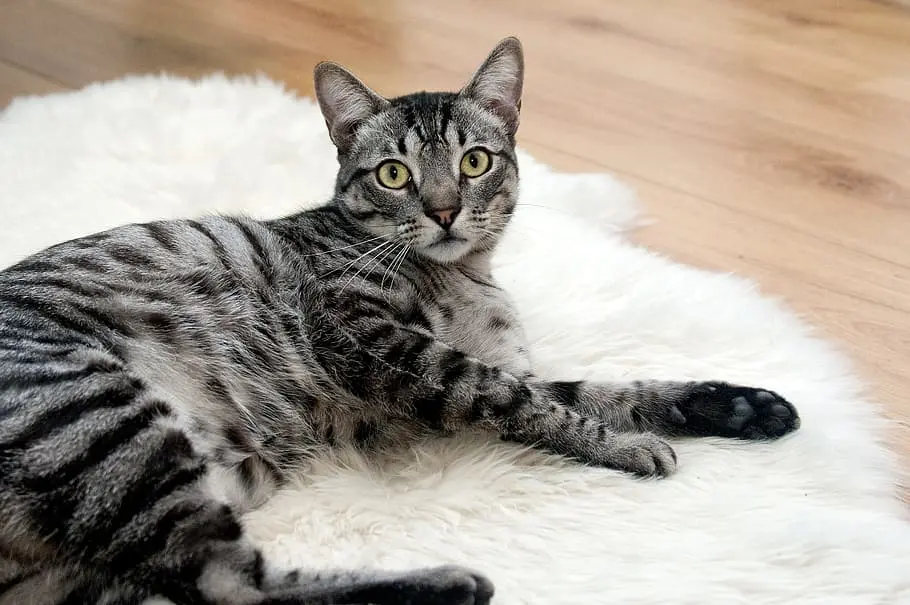
Egyptian Mau cat
The Egyptian Mau cat is a unique breed with several distinctive characteristics that set it apart from other cat breeds. One of the most notable traits of the Egyptian Mau is its coat, which has a spotted or marbled pattern and is considered one of the only naturally spotted cat breeds. The coat is also relatively low-maintenance, requiring minimal grooming compared to other breeds. Egyptian Maus are known for their athleticism and agility, making them great pets for owners who enjoy playing with their cats.
Egyptian Maus are also highly intelligent and can be trained to perform tricks or even walk on a leash. They are social cats that enjoy human interaction, but they can also be independent and may not demand constant attention from their owners. Additionally, Egyptian Maus have a distinctive “chirping” vocalization that is unlike the typical meowing of other cat breeds.
One potential downside of owning an Egyptian Mau is that they can be highly active and require plenty of playtime and exercise to avoid becoming bored or destructive. They may not be suitable for apartment living or for owners who are not able to provide sufficient play opportunities. Overall, the Egyptian Mau is an interesting and unique breed that makes a great companion for owners who are willing to provide plenty of attention and playtime.
| Energy level | High | Origin | Egypt |
| Grooming requirements | Low | Coat type | Short-haired |
| Size | Medium | Intelligence | High |
| Temperament | Independent | Personality traits | Intelligent, active |
| Health concerns | Susceptible to diseases, dental issues | Vocalization | Moderate |
| Activity level | High | Socialization | Moderate |
| Living situation | Indoor/outdoor | Cost | Moderate |
| Trainability | Moderate | Purpose | Companion, hunting |
| Compatibility | Good with children and other pets | Commitment | Long-term commitment |
| Energy level | High |
| Grooming requirements | Low |
| Size | Medium |
| Temperament | Independent |
| Health concerns | Susceptible to diseases, dental issues |
| Activity level | High |
| Living situation | Indoor/outdoor |
| Trainability | Moderate |
| Compatibility | Good with children and other pets |
| Origin | Egypt |
| Coat type | Short-haired |
| Intelligence | High |
| Personality traits | Intelligent, active |
| Vocalization | Moderate |
| Socialization | Moderate |
| Cost | Moderate |
| Purpose | Companion, hunting |
| Commitment | Long-term commitment |
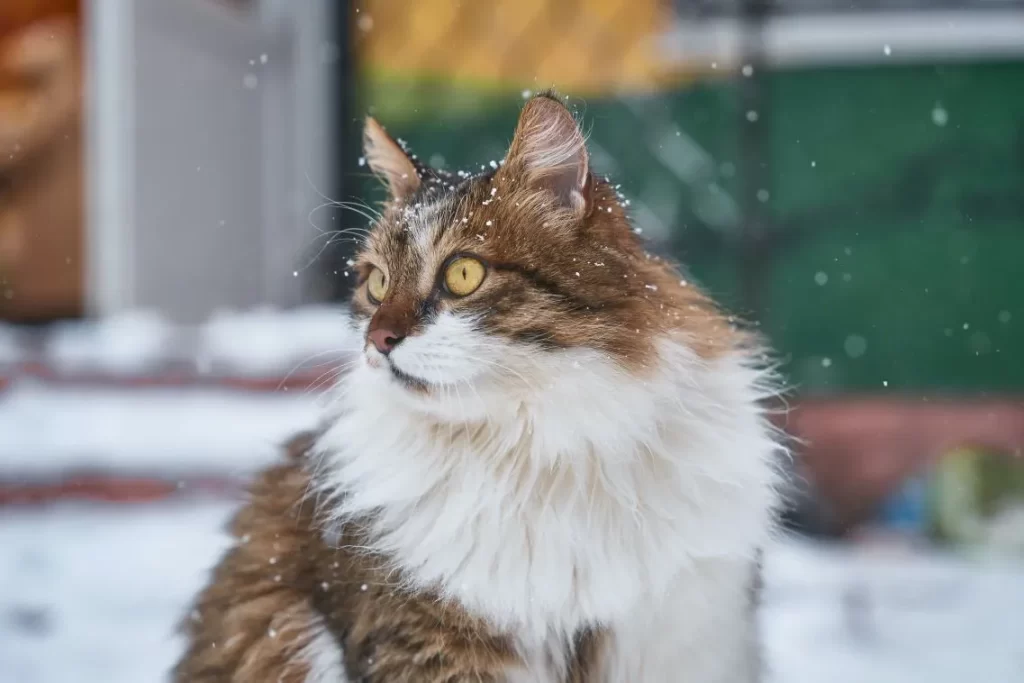
Norwegian Forest cat
The Norwegian Forest cat, also known as the “skogkatt,” is a unique breed known for its thick, water-resistant coat, large size, and muscular build. This breed originated in Norway and was used as a working cat to help control rodent populations in barns and homes. Today, the Norwegian Forest cat is a popular breed for those who want an active and playful companion. One of the distinctive characteristics of this breed is their love of climbing and perching, so providing plenty of vertical spaces in the home is important.
Norwegian Forest cats are also known for their loyalty and affection towards their owners. They are intelligent cats and can be trained to do tricks or play games, making them a great option for owners who enjoy training their pets. However, due to their natural hunting instincts, Norwegian Forest cats may not be suitable for households with smaller pets, such as hamsters or birds.
Despite their large size, Norwegian Forest cats are generally gentle and patient with children, making them an excellent family pet. They are also relatively low-maintenance and require minimal grooming compared to other long-haired breeds. Overall, the Norwegian Forest cat is a loving and active companion that makes an excellent addition to any household that can provide plenty of playtime, climbing opportunities, and affection.
| Energy level | High | Origin | Norway |
| Grooming requirements | Moderate | Coat type | Long-haired |
| Size | Large | Intelligence | High |
| Temperament | Friendly | Personality traits | Playful |
| Health concerns | Hypertrophic cardiomyopathy, hip dysplasia | Vocalization | Moderate |
| Activity level | High | Socialization | High |
| Living situation | Indoor/outdoor | Cost | High |
| Trainability | High | Purpose | Hunting |
| Compatibility | Good with children and dogs | Commitment | Long-term commitment |
| Energy level | High |
| Grooming requirements | Moderate |
| Size | Large |
| Temperament | Friendly |
| Health concerns | Hypertrophic cardiomyopathy, hip dysplasia |
| Activity level | High |
| Living situation | Indoor/outdoor |
| Trainability | High |
| Compatibility | Good with children and dogs |
| Origin | Norway |
| Coat type | Long-haired |
| Intelligence | High |
| Personality traits | Playful |
| Vocalization | Moderate |
| Socialization | High |
| Cost | High |
| Purpose | Hunting |
| Commitment | Long-term commitment |
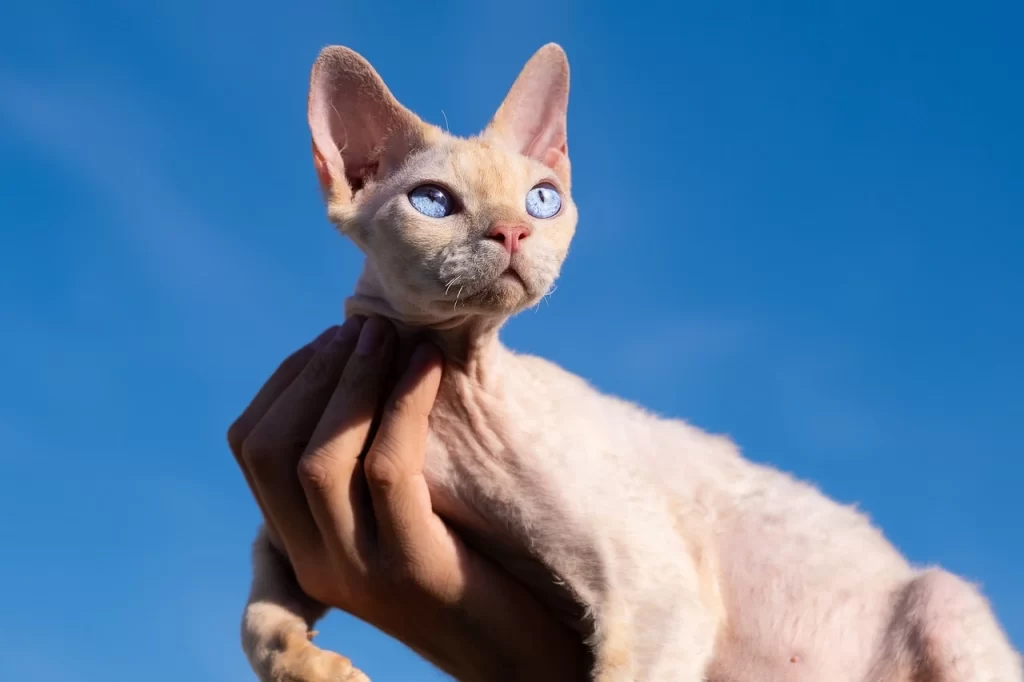
Devon Rex cat
The Devon Rex is a unique and striking breed known for its distinctive curly coat, large ears, and slender build. This breed originated in England and has since become popular around the world due to their playful and affectionate nature. The Devon Rex is an active and intelligent breed that enjoys playtime, training, and spending time with their owners. They are also known for their love of climbing and exploring, so providing plenty of vertical spaces in the home is essential.
Devon Rex cats have a friendly and outgoing personality, making them an excellent choice for families with children and other pets. They are also relatively low-maintenance and require minimal grooming compared to other long-haired breeds. However, due to their active nature, they may not be suitable for households with limited space or those who prefer a more relaxed pet.
It’s important to note that Devon Rex cats are prone to certain health issues, including respiratory problems and skin allergies. Owners should be aware of these potential health concerns and work closely with their veterinarian to keep their pet healthy and happy. Overall, the Devon Rex is a fun-loving and loyal companion that makes a great addition to any household that can provide plenty of playtime, affection, and attention to their unique needs.
| Energy level | High | Origin | United Kingdom |
| Grooming requirements | Low | Coat type | Short-haired |
| Size | Small | Intelligence | High |
| Temperament | Playful | Personality traits | Mischievous, affectionate |
| Health concerns | Heart problems, skin conditions | Vocalization | High |
| Activity level | High | Socialization | High |
| Living situation | Indoor only | Cost | High |
| Trainability | High | Purpose | Companion, show |
| Compatibility | Good with children and other pets | Commitment | Long-term commitment |
| Energy level | High |
| Grooming requirements | Low |
| Size | Small |
| Temperament | Playful |
| Health concerns | Heart problems, skin conditions |
| Activity level | High |
| Living situation | Indoor only |
| Trainability | High |
| Compatibility | Good with children and other pets |
| Origin | United Kingdom |
| Coat type | Short-haired |
| Intelligence | High |
| Personality traits | Mischievous, affectionate |
| Vocalization | High |
| Socialization | High |
| Cost | High |
| Purpose | Companion, show |
| Commitment | Long-term commitment |
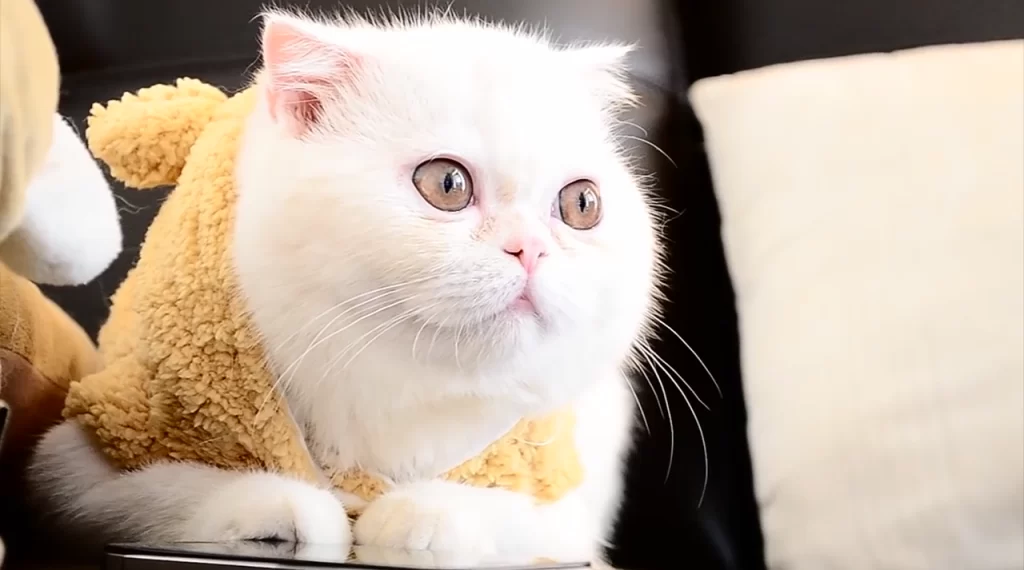
Exotic Shorthair cat
The Exotic Shorthair is a breed of cat that is known for its cute and cuddly appearance, which makes it an ideal pet for those who love to snuggle with their furry companions. This breed is a result of crossbreeding between the Persian cat and the American Shorthair, which gives it the best of both worlds. The Exotic Shorthair is a calm and friendly cat that loves attention from its owners. They have a laid-back personality and are not as energetic as some other cat breeds, which makes them suitable for apartment living. The Exotic Shorthair is known for its round face, big round eyes, and short snub nose, which gives it an adorable and unique appearance. They come in a variety of colors, such as white, black, blue, cream, and more.
Exotic Shorthairs have a dense, soft coat that requires minimal grooming, making them an ideal choice for busy owners who don’t have a lot of time for grooming their pets. They are prone to some health issues, such as breathing difficulties and dental problems, which require regular veterinary care. This breed is also prone to obesity, so owners should monitor their diet and ensure they get enough exercise to maintain a healthy weight. Exotic Shorthairs are affectionate and love to be around their owners, but they can also be independent at times. They are a great choice for families with children and other pets, as they are gentle and playful with both. Overall, the Exotic Shorthair is a lovely breed that is perfect for those looking for a low-maintenance, affectionate, and adorable companion.
| Energy level | Low | Origin | United States |
| Grooming requirements | Moderate | Coat type | Short-haired |
| Size | Medium | Intelligence | Low |
| Temperament | Affectionate | Personality traits | Sweet, playful |
| Health concerns | Respiratory problems, dental issues | Vocalization | Low |
| Activity level | Low | Socialization | High |
| Living situation | Indoor only | Cost | High |
| Trainability | Moderate | Purpose | Companion |
| Compatibility | Good with children and other pets | Commitment | Long-term commitment |
| Energy level | Low |
| Grooming requirements | Moderate |
| Size | Medium |
| Temperament | Affectionate |
| Health concerns | Respiratory problems, dental issues |
| Activity level | Low |
| Living situation | Indoor only |
| Trainability | Moderate |
| Compatibility | Good with children and other pets |
| Origin | United States |
| Coat type | Short-haired |
| Intelligence | Low |
| Personality traits | Sweet, playful |
| Vocalization | Low |
| Socialization | High |
| Cost | High |
| Purpose | Companion |
| Commitment | Long-term commitment |
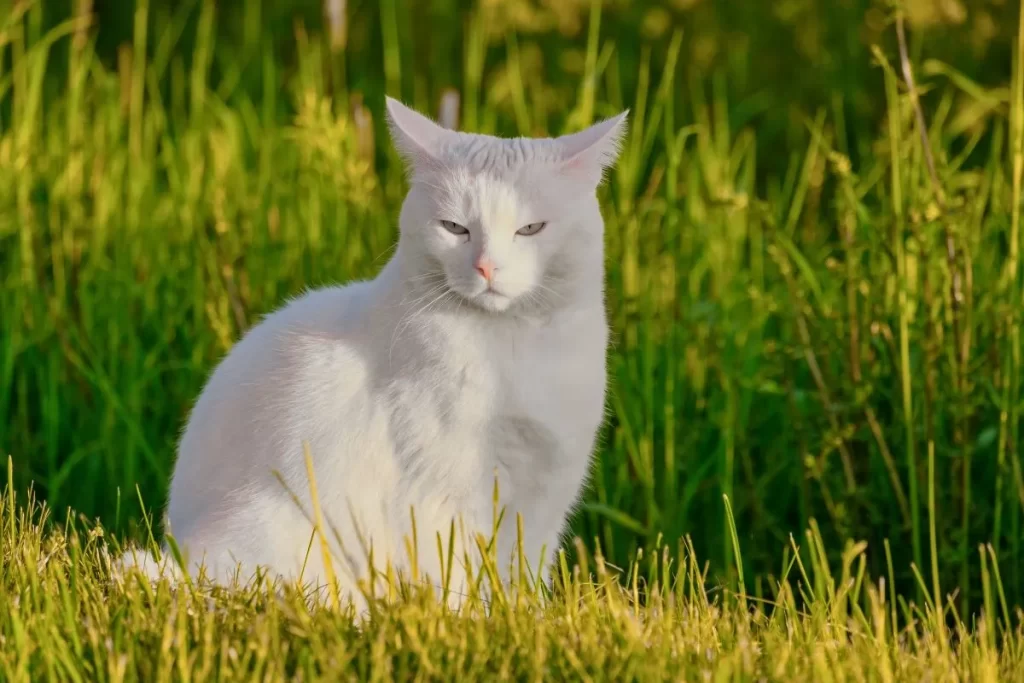
Turkish Angora cat
The Turkish Angora cat is a medium to large-sized breed of cat that is highly prized for its unique appearance and friendly personality. With their striking blue or green eyes, long, silky coats, and elegant frames, Turkish Angoras are often referred to as the “ballerinas of the cat world”. One of the most distinctive features of the Turkish Angora is their long, fluffy tail, which they often hold high in the air like a banner. In addition to their good looks, Turkish Angoras are known for their playful, affectionate, and curious personalities. They are highly intelligent cats that enjoy being around people, making them a popular choice for families and individuals alike.
Turkish Angoras are also known for their high energy levels and love of play. They are an active breed that enjoys chasing toys, playing games, and exploring their environment. Due to their high activity levels, Turkish Angoras require plenty of space to roam and play, making them an ideal choice for households with ample indoor and outdoor space. In addition to their need for exercise, Turkish Angoras are also highly social cats that require plenty of attention and interaction from their owners. They are not the type of cat to be left alone for long periods of time and thrive in homes where they receive plenty of love and attention.
| Energy level | High | Origin | Turkey |
| Grooming requirements | High | Coat type | Long-haired |
| Size | Medium | Intelligence | High |
| Temperament | Active | Personality traits | Playful |
| Health concerns | Deafness | Vocalization | High |
| Activity level | High | Socialization | High |
| Living situation | Indoor/outdoor | Cost | High |
| Trainability | High | Purpose | Companion |
| Compatibility | Good with children and other pets | Commitment | Long-term commitment |
| Energy level | High |
| Grooming requirements | High |
| Size | Medium |
| Temperament | Active |
| Health concerns | Deafness |
| Activity level | High |
| Living situation | Indoor/outdoor |
| Trainability | High |
| Compatibility | Good with children and other pets |
| Origin | Turkey |
| Coat type | Long-haired |
| Intelligence | High |
| Personality traits | Playful |
| Vocalization | High |
| Socialization | High |
| Cost | High |
| Purpose | Companion |
| Commitment | Long-term commitment |
Important Factors to Consider When Choosing a Cat for Your Home
Lifestyle: When considering a cat, think about how they will fit into your lifestyle. If you work long hours or travel frequently, a more independent cat, such as a Persian or British Shorthair, may be a better fit. If you have more time to devote to your cat, a more social breed like the Siamese or Burmese may be more appropriate.
Age: The age of the cat you adopt will depend on your preferences and lifestyle. Kittens are playful and require more attention and training, while adult cats are generally more laid-back and may be more suitable for busy households. Breeds like the Maine Coon, known for their gentle nature, can make excellent pets for families with children.
Personality: Each cat has a unique personality, so it’s essential to consider what traits you’re looking for in a pet. Breeds like the Abyssinian and Bengal are known for their playful and curious nature, while the Ragdoll and Persian are more laid-back and affectionate.
Grooming: Different cat breeds have varying grooming requirements, so it’s essential to think about how much time you’re willing to devote to grooming. Breeds like the Siamese and Sphynx require little to no grooming, while long-haired breeds like the Maine Coon and Siberian need daily grooming.
Health: Health should always be a top priority when choosing a cat. Look for a cat that has no visible signs of illness or injury. Breeds like the American Shorthair and Russian Blue are known for their robust health.
Breed: The breed of cat you choose should suit your personality and lifestyle. Active breeds like the Bengal and Abyssinian require plenty of playtime and attention, while more laid-back breeds like the Ragdoll and Persian are better suited for quieter households.
Energy level: A cat’s energy level can vary from breed to breed, so it’s essential to consider how much energy you’re willing to commit to. The Siamese and Bengal are known for their high energy levels, while the Scottish Fold and British Shorthair are more low-maintenance.
Size: Cat breeds come in all shapes and sizes, from the petite Singapura to the large and imposing Maine Coon. If you’re looking for a cat that won’t take up too much space, breeds like the Siamese or Devon Rex may be more appropriate.
Living situation: Your living situation should be considered when adopting a cat. If you live in a small apartment, breeds like the Cornish Rex or Siamese may be better suited. If you have a more substantial living space, breeds like the Maine Coon or Siberian may be more appropriate.
Training: While all cats require some training, some breeds are more receptive to training than others. Breeds like the Scottish Fold and Burmese are known for their intelligence and trainability, while more independent breeds like the Persian and Russian Blue may require more patience.
Activity level: The amount of activity a cat requires can vary widely, so it’s essential to choose a breed that matches your lifestyle. If you’re looking for a cat that loves to play and explore, breeds like the Bengal or Abyssinian may be more suitable. If you prefer a cat that is more laid-back, breeds like the Ragdoll or Persian may be a better fit.
Behavior: Choosing a cat with good behavior is crucial. Breeds like the Burmese and Abyssinian are known for their social and outgoing nature, while more independent breeds like the Scottish Fold and Persian can be more reserved.
Compatibility: When considering a new cat, it is important to consider if the cat you choose will get along with other pets or children in your home. Some cat breeds are known to be more social and friendly with other pets and children, such as the Ragdoll, Persian, and Siamese breeds. However, it is important to note that every cat has its unique personality and may not necessarily fit the breed stereotypes.
Adoption: Consider adopting a cat from a shelter or rescue organization. Many of these cats are in need of a loving home and may already be litter box trained and socialized. Adopting a cat can also be more cost-effective than buying a cat from a breeder.
Cost: Owning a cat can be expensive, and it is important to consider the cost of cat food, litter, toys, and vet bills before bringing a cat into your home. Some breeds, such as the Bengal and Persian breeds, may require more expensive food and grooming products.
Time commitment: Caring for a cat requires a significant time commitment, including feeding, grooming, and playtime. Some breeds, such as the Siamese and Bengal breeds, require more playtime and exercise to prevent boredom and destructive behavior.
Personality traits: When choosing a cat, consider what personality traits you want in a pet, such as affectionate, independent, or playful. Some breeds, such as the Siamese and Persian breeds, are known to be more affectionate and social with their owners.
Family situation: Consider if a cat would fit well into your family situation, including the age and number of family members. Some breeds, such as the Ragdoll and Maine Coon breeds, are known to be more patient and friendly with children.
Breed-specific health concerns: Some cat breeds have genetic health concerns, so research any potential health issues before choosing a breed. For example, the Persian breed is prone to respiratory issues, while the Siamese breed may be prone to dental problems.
Commitment: Remember that owning a cat is a long-term commitment, and you will be responsible for its care and well-being for many years to come. Consider if you have the time, resources, and commitment to provide a loving home for a cat.

